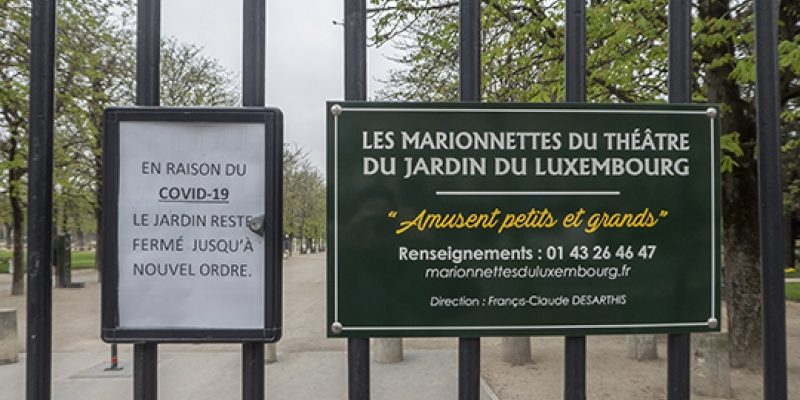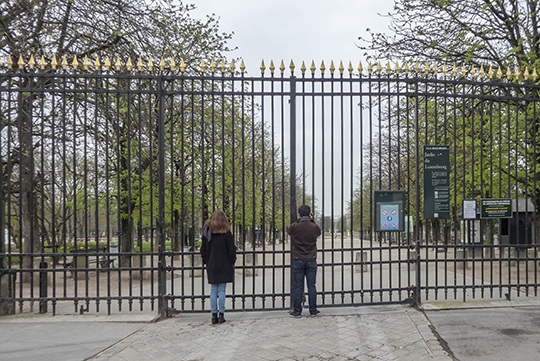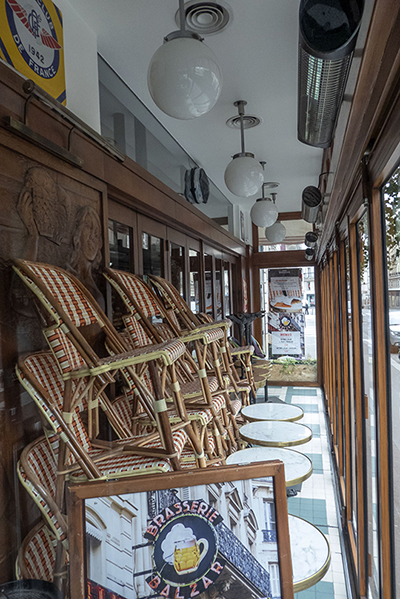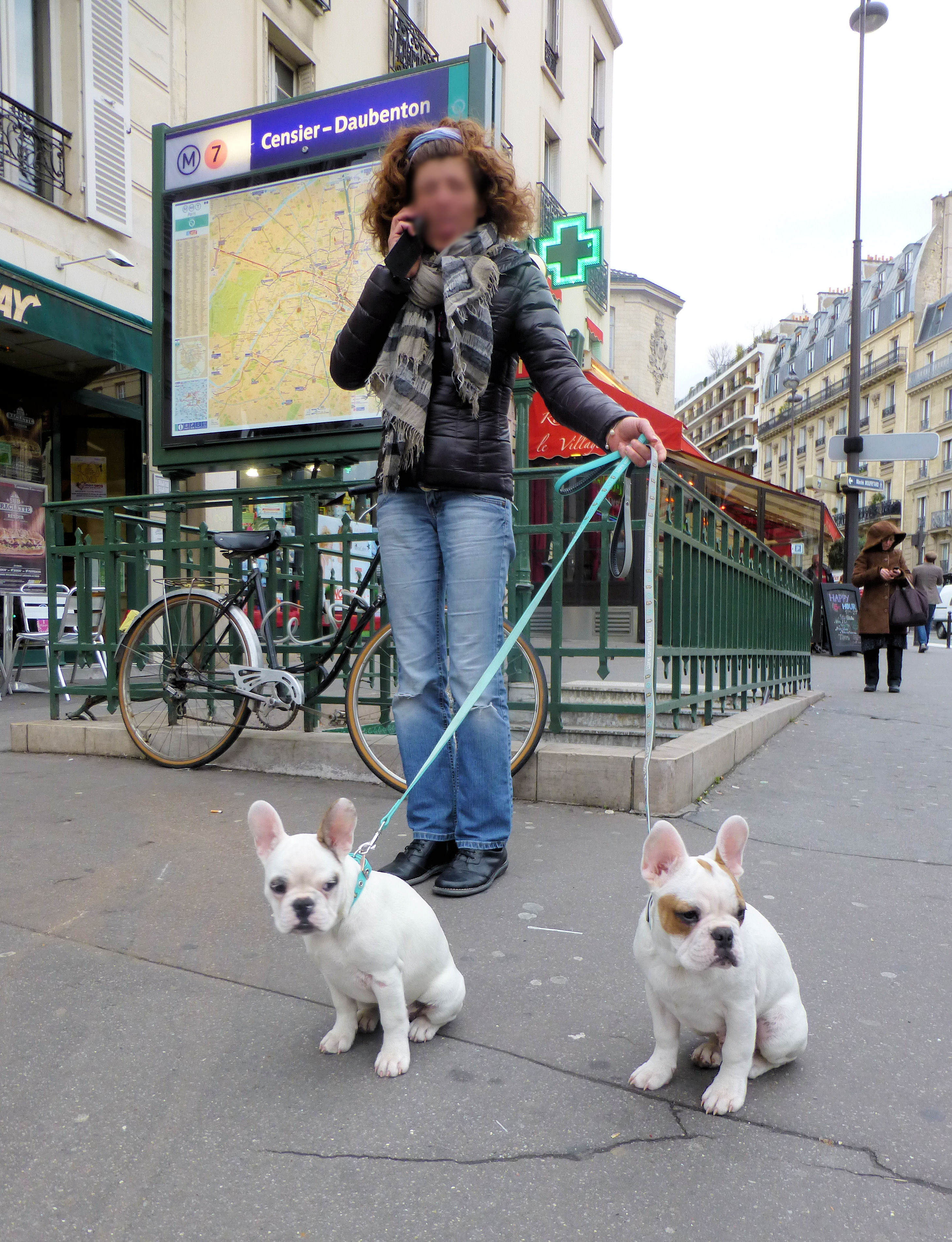
Thursday, March 19th, 2020
Paris Is Locked Down
Cover image: White sign on Luxembourg Garden gate says "Because of COVID-19, the garden is closed until further notice."
© Entrée to Black Paris
Paris has become a ghost town.
Because of the COVID-19 pandemic, normal life for Paris' citizens - indeed, for all French citizens and permanent residents - has been tremendously curtailed.
 Luxembourg Garden closed until further notice
Luxembourg Garden closed until further notice
© Entrée to Black Paris
Tourist activities are completely halted.
We got a glimpse of how serious things were when the Louvre closed on March 1 and 2 over employee concerns about contracting the virus from visitors. But it reopened on March 4 and things continued more or less normally for several days.
On March 7, we learned that France's death toll from COVID-19 rose to 16. Gatherings of more than 1000 persons were banned on March 8, but business mostly continued as usual.
On March 12, French president Emmanuel Macron announced that all schools throughout the country, from nursery level to university, were to close as of Monday, March 16 and to remain closed through spring break.
On March 13, the government acknowledged that the virus was actively circulating among the French population and banned assemblies of more than 100 persons.
That same day, the Louvre, Versailles Palace, the Orsay Museum, and the Disneyland parks all announced that they would close until further notice.
Curiously, the gilets jaunes (yellow jackets) protestors, some of whom caused severe damage to businesses on the Champs Elysées last year and drastically disrupted commerce during the 2019 Christmas season, were allowed to hold demonstrations around the city on Saturday, March 14.
On Sunday evening, March 15, President Macron went on television to announce the mandatory nationwide closing of all "non-essential" businesses until further notice. These include restaurants, cafés, bars and clubs, and cinemas.
 Terrace at Brasserie Balzar
Terrace at Brasserie Balzar
© Entrée to Black Paris
Supermarkets and other food and wine purveyors, pharmacies, banks, gas stations, press outlets, and tabacs remain open. Food establishments that provide take-out and/or deliver items also remain open.
Places of worship are open but no more than 20 persons can assemble there at any given time. Masses and other ceremonies are not permitted until further notice.
Over the weekend, large numbers of people were seen to gather at the city's parks and gardens. So, President Macron announced further restrictions on March 16 "to prevent the propagation of the virus and to save lives."
Here is a synopsis of the announcement:
As of 12 noon on March 17, and for a minimum of two weeks, anyone leaving her or his home must do so with a signed declaration that specifies the purpose of the outing.
Those who are unable to work remotely are permitted to go to work.
Those who do not have access to childcare for children up to 16 years of age and who cannot work from home have the right to paid "sick leave." (This is applicable to one parent per household.)
Other acceptable reasons for being on the street are limited to shopping for essential items, health-related excursions (human or animal), tending to sick family members, child care external to the home, and brief outings close to one's home for exercise - excluding team sports or informal group gatherings - and for walking one's dog.
 Walking dogs
Walking dogs
© Entrée to Black Paris
Those who venture out must keep one meter of distance between themselves and others.
Employers are required to provide employees with declarations. Individuals are asked to download the declaration form from the government's website and/or use photocopies of the official form.
Anyone found in violation of these restrictions can be fined between 38 and 135 euros.
In response to the prospect of "confinement," thousands of Parisians left the city by car or by train on March 16 and early on March 17 to take up temporary residence in family homes elsewhere in France.
 Two TGV trains at Gare de Lyon
Two TGV trains at Gare de Lyon
Source: Wikimedia Commons; Photographer: S23725
CC-BY-SA-4.0
Unfortunately, this will almost certainly increase the spread of the virus in less affected areas of the country.
In Paris, essential public service offices remain open and public transportation continues to function, albeit with reduced service. Usage is restricted to those needing to go to and from work.
The government has indicated that there is no need to hoard supplies - no shortage of merchandise is foreseen, and stores will be restocked regularly. The cost of hand sanitizing gels has been fixed by decree to avoid price gouging.
The borders of all Schengen countries were closed on March 17 for 30 days. All French citizens have the right to return to France if they are abroad.
Currently, no vacation travel is allowed within France. No French students are permitted to participate in study abroad trips at this time.
The second round of Paris' municipal elections, which was scheduled for Sunday, March 22, has been postponed.
With all these measures in place, we are hopeful that we will see the end of the pandemic in France within the next 30-60 days.

 Our Walk: Black History in and around the Luxembourg Garden - Click here to book!
Our Walk: Black History in and around the Luxembourg Garden - Click here to book!